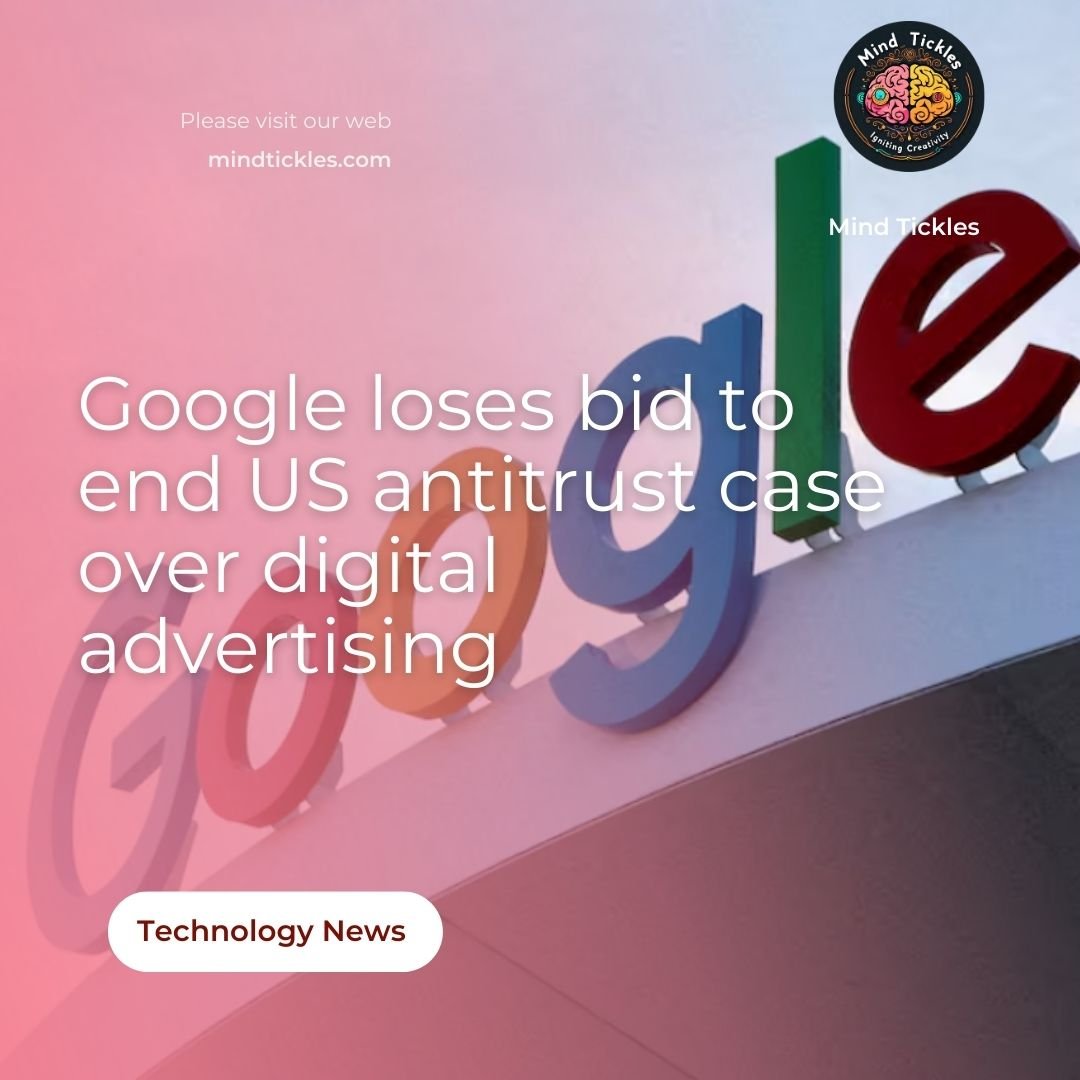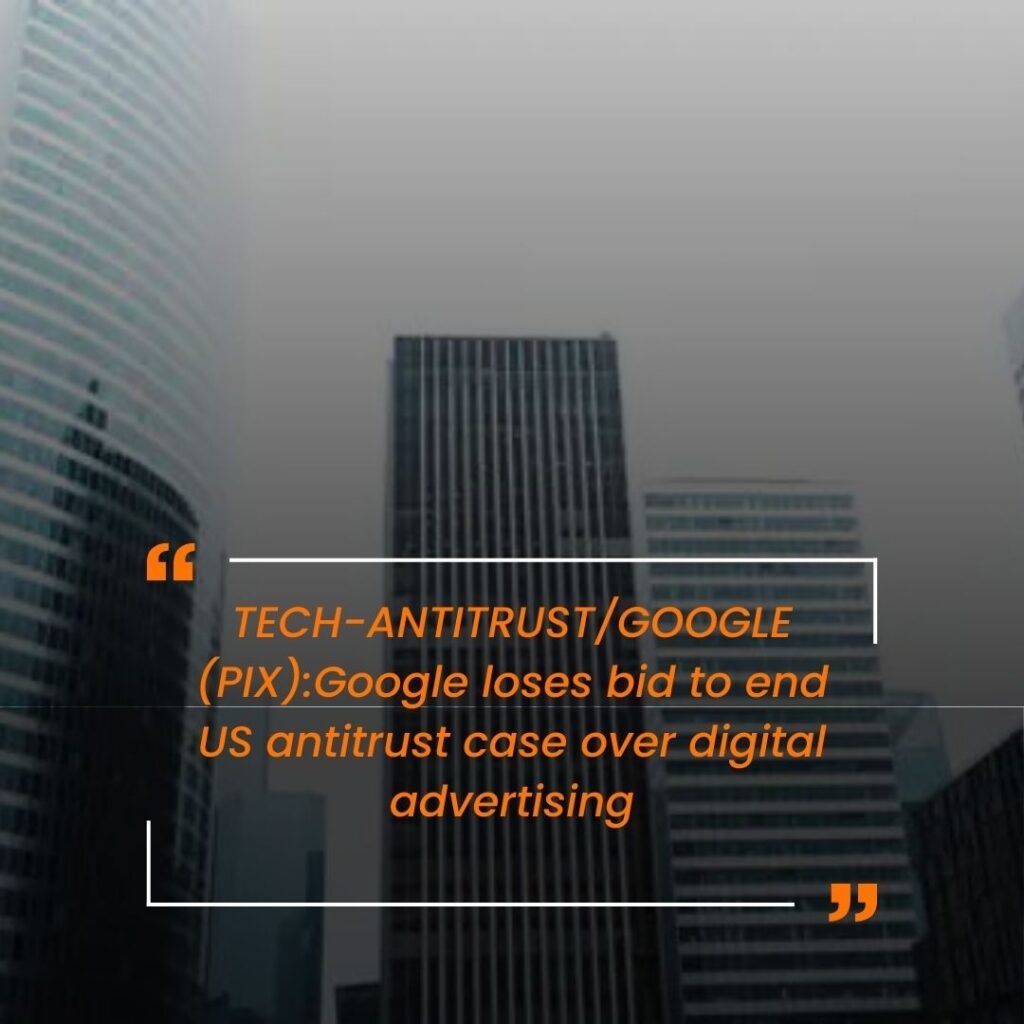Google loses bid to end US antitrust case over digital advertising

On June 14, 2024, a federal judge deals a big blow to Google Alphabet Inc’s ( GOOGL. O) Google when determining that the tech company must answer to charges in an intense antitrust case This development is a key indicator in the rising high-profile cases in competition law about Google’s status in the digital advertising technology market. Federal District Court Judge Leonie Mr. Brinkema battling the company doesn’t allow googles motion to dismiss the case thus bringing to light all preys and repercussions of the case. This article provides more depth regarding the particulars of the case, specific points made by the counsels and consequences for Google and tech businesses as a whole.
Background of the Antitrust Case
The antitrust case against Google was filed by the U. S. Department of Justice (DOJ) along with a group of individual states in the year of 2023. Specifically, the u s antitrust enforcers ‘claim that Google has been involved in unlawful monopoly in the analytically-driven digital advertising market that caused the monopolization and overcharging of ad performers and publishers. It is done as part of the ongoing efforts of the regulators to reign in the monopolistic control that these large technology companies exercise over markets all around the world and level the playing field for competition in the online advertising technology market front.

Key Allegations
The primary allegations against Google include:
Monopolistic Practices: The matter of a case involves attitude of Google which is alleged to have used its dominance of the online advertising market to lock out rivals.
Overcharging Users: The suit alleges that through Google’s dominance in the ad tech industry or tech Giant, price increases dominate while revenues for the actual publishers suffer.
Anti-Competitive Behavior: Litigants such as the DOJ and state attorneys general qualified the practices of Google as inhibitive of innovation, thereby providing less selection for enterprises and animators.
Google’s Defense
Google has strongly dismissed the allegations stating that the activities are legal and growth promoting among the customers and advertisers. The company’s key defense points include:
Market Definition: Google wrote that the plaintiffs have not provided an objective definition of the relevant market, which is critical in antitrust actions.
Competitive Practices: These remain the defense of the company, which claims that many of the practices that are frowned upon in the ad tech industry are merely competitive and have brought about innovation and efficiency.
Lack of Harm: Some of the legal arguments that Google has given include stating that there is no advertiser harm or consumer harm or harm to competition.
Judge Brinkema’s Ruling
Friday saw U. S. District Judge Leonie Brinkema reject Google’s motion for internet search juggernaut Summary, a procedural motion used in a bid to dispense with trial provision. Brinkema was justified in making a decision based on concerns of factual disputes which have to go to court records or record papers. This ruling paves way for a trial expected to commence on and in Sep 09.
Implications of the Ruling
The denial of Google’s motion is significant for several reasons:
Legal Precedent: The case could establish a legal basis for the applicability of the antitrust laws to the technological marketplaces mainly involving the popular technology platforms.
Market Impact: Google could be forced to make some radical shifts in the advertising trade should it lose the case – it may have to split some parts of Google’s advertisement technology and ad tech market into individual entities in an effort to induce competition.
Regulatory Scrutiny: It also highlights the high risk of the large Internet players facing higher regulatory pressure and could trigger more antitrust cases against other market participants.
Expert Testimony and Trial Proceedings
In the forthcoming trial, pro and the cons are willing to present their evidence and the general arguments for the case. However, there is the case where Judge Brinkema has excluded a former FBI agent who consulted Google as an expert in cyber security. This could effectively play part in changing the course of the trial by restricting the kind of evidence Google can use in defense.
Google’s Strategic Adjustments
Since the filing of the case, there have been certain changes of tide in terms of legal strategies that Google has employed in the last few weeks. I remarked last week Friday about a vmitory when Judge Brinkema decided to go FBI Agent forward with the trial without a jury. This decision came after Google addressed some of the headings causing harm to the U. S government which made the upcoming trial a streamlined affair.
Broader Context and Industry Reactions
The antitrust case against Google’s digital advertising business is a part of an approach in a global level regulating the mighty presence of major tech giants. As for the social component, in the last decade governments of different countries have turned a closer attention to many firms, including Google, Facebook, Amazon, and Apple
Reactions from the Tech Industry
They, the tech industry if you like, is keenly observing this case and their fate maybe doomed if the result of this case is not in their favor. Buyers and industry analysts have in general endorsed different regulatory initiatives to equalize the competitive battleground saying that many opponents are overemphasizing on fears of over-regulation and marketplace disincentivization.
Potential Outcomes and Consequences
Breakup of Google’s Ad Business: When a verdict finally gets handed down against Google, pieces of its digital advertising franchises might have to be sold off.
Increased Regulation: Thus, the case may trigger even more stringent rules, concerns, and regulation of digital advertising and other practices in the sphere of technologies.
Financial Penalties: And, if guilty of antitrust violations, Google could be subject to fines and penalties that may significantly impact its financial situation.
Conclusion
This milestone antitrust trial is still ongoing with Google accused of being a monopolist controlling some of the most important markets in digital advertising. Such a ruling is crucial to make sure that the allegations against Google are to be investigated and discussed during the trial. Finally, as the trial advances and the date of its completion nears, the representatives of the tech industry, regulatory bodies, and consumers across the world will turn into attentive observers to understand what further steps in the development of digital competition this case will introduce.
.

If you want to read more information just visit –> Mind Tickles




